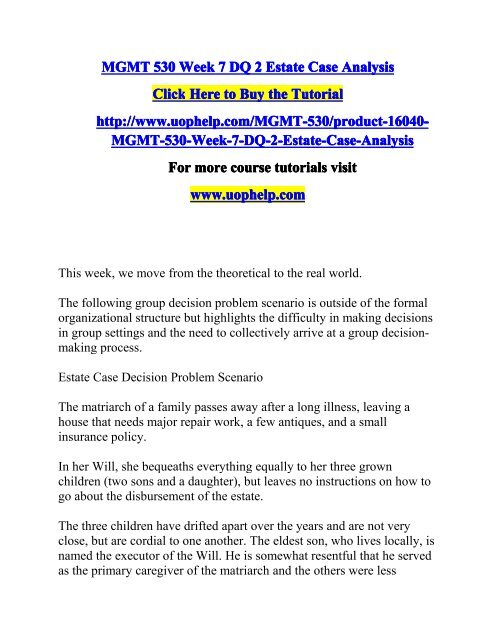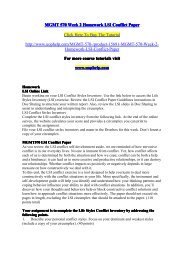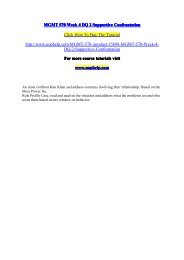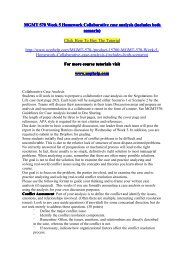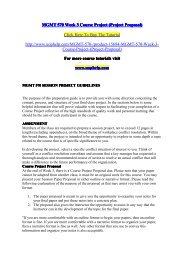MGMT 530 Week 7 DQ 2 Estate Case Analysis
For more course tutorials visit www.uophelp.com This week, we move from the theoretical to the real world. The following group decision problem scenario is outside of the formal organizational structure but highlights the difficulty in making decisions in group settings and the need to collectively arrive at a group decision-making process. Estate Case Decision Problem Scenario
For more course tutorials visit
www.uophelp.com
This week, we move from the theoretical to the real world.
The following group decision problem scenario is outside of the formal organizational structure but highlights the difficulty in making decisions in group settings and the need to collectively arrive at a group decision-making process.
Estate Case Decision Problem Scenario
- No tags were found...
You also want an ePaper? Increase the reach of your titles
YUMPU automatically turns print PDFs into web optimized ePapers that Google loves.
<strong>MGMT</strong> <strong>530</strong> <strong>Week</strong> 7 <strong>DQ</strong> 2 <strong>Estate</strong> <strong>Case</strong> <strong>Analysis</strong><br />
Click Here to Buy the Tutorial<br />
http://www.uophelp.com/<strong>MGMT</strong>-<strong>530</strong>/product-16040-<br />
<strong>MGMT</strong>-<strong>530</strong>-<strong>Week</strong>-7-<strong>DQ</strong>-2-<strong>Estate</strong>-<strong>Case</strong>-<strong>Analysis</strong><br />
For more course tutorials visit<br />
www.uophelp.com<br />
This week, we move from the theoretical to the real world.<br />
The following group decision problem scenario is outside of the formal<br />
organizational structure but highlights the difficulty in making decisions<br />
in group settings and the need to collectively arrive at a group decisionmaking<br />
process.<br />
<strong>Estate</strong> <strong>Case</strong> Decision Problem Scenario<br />
The matriarch of a family passes away after a long illness, leaving a<br />
house that needs major repair work, a few antiques, and a small<br />
insurance policy.<br />
In her Will, she bequeaths everything equally to her three grown<br />
children (two sons and a daughter), but leaves no instructions on how to<br />
go about the disbursement of the estate.<br />
The three children have drifted apart over the years and are not very<br />
close, but are cordial to one another. The eldest son, who lives locally, is<br />
named the executor of the Will. He is somewhat resentful that he served<br />
as the primary caregiver of the matriarch and the others were less
involved. The other two don't get along very well.<br />
The son that is the executor is not sure what to do, but would like to<br />
hang on to the house for a while until the real estate market improves<br />
and eventually try to sell it for more money than it is worth today.<br />
The daughter thinks that the house should be fixed up with the insurance<br />
money and then sold immediately.<br />
The other son thinks that the house should be sold as is and to not put<br />
any more money into it, splitting the insurance money between the three.<br />
In summary, the facts are as follows.<br />
Objectives<br />
Objective 1—Achieve the highest sale price (twice as important as the<br />
other objectives)<br />
Objective 2—Keep reinvestment in repair and maintenance in house at a<br />
minimum<br />
Objective 3—Complete transaction in the shortest period of time<br />
Alternatives<br />
Alternative 1—Sell the house as is. The real estate agent feels that the<br />
house would sell for $79,000 and could likely sell the house in<br />
approximately one month. No money would be put into fixing up the<br />
house.<br />
Alternative 2—Fix up the house, and then sell. The real estate agent<br />
feels that the house would sell for $96,000 and could likely sell the<br />
house in approximately three months. Approximately $15,000 would be<br />
put into fixing the house.<br />
Alternative 3—Wait until the market improves, then fix up and sell. The<br />
real estate agent feels that the house would sell for $120,000 if the<br />
market improved, but it would take at least one year. Approximately
$15,000 would be put into fixing the house and another $5,000 for<br />
ongoing maintenance and upkeep.<br />
Based on the facts described, address the following.<br />
1. What is the general nature of the problem?<br />
2. What event triggered the situation?<br />
3. Are we imposing any constraints on the situation?<br />
4. What are the underlying elements of the problem?<br />
5. Are there dependencies on other decisions?<br />
6. What are the consequences and tradeoffs?<br />
7. What group decision-making dynamics are in play here?<br />
8. Based on a weighted scoring model, which would be the best<br />
alternative (show your work)?


